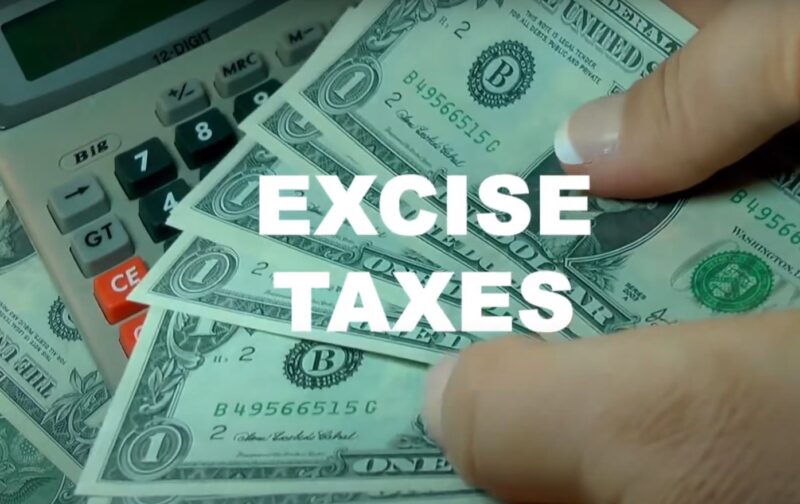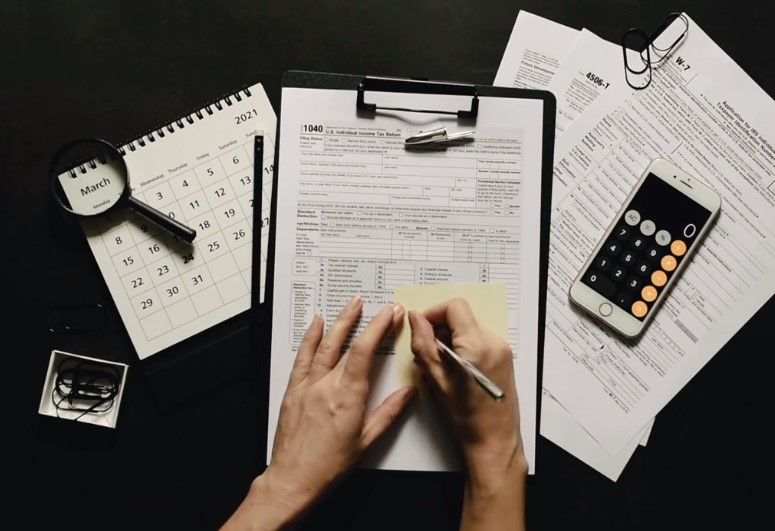In the United States, the government collects taxes in many forms, with responsibilities divided among federal, state, and local levels. Taxes on consumption, such as excise tax and sales tax, significantly affect our daily lives. These taxes, though similar in their end effect of raising revenue, differ in their application, scope, and impact.
Key Takeaways
What is an Excise Tax?

An excise tax is a specific, often targeted tax levied on certain goods, services, or activities. It can be a fixed amount or a percentage of the sale price but is applied to specific items rather than a broad range of goods.
Common examples include taxes on gasoline, cigarettes, alcohol, and luxury items. The purpose of excise taxes can vary, from raising revenue to discouraging the consumption of harmful products or funding related infrastructure.
These taxes are integral to managing public health and safety by indirectly controlling the consumption of potentially harmful substances. Additionally, excise taxes can be instrumental in environmental conservation efforts, such as taxing pollutants to fund clean-up and conservation projects.
Key Characteristics
- Specificity: Excise taxes target specific goods or services, making them highly effective tools for policy objectives related to public health, safety, and the environment. This targeted approach allows governments to address specific concerns without broadly impacting the economy.
- Purpose-Driven: Often implemented to discourage harmful behaviors or fund-related services, excise taxes serve as both deterrents and financial support for government initiatives. They are a critical component of broader strategies to improve public welfare and fund sector-specific projects.
- Fixed or Ad Valorem: This can be a fixed amount or a percentage of the price, providing flexibility in how these taxes are applied and allowing for targeted adjustments to achieve desired policy outcomes. This variability ensures that the tax burden can be calibrated to reflect the societal costs associated with the consumption of these goods.
What is a Sales Tax?

Sales tax, in contrast, is a general tax applied to the sale of most goods and services, with certain exemptions like unprepared food and clothing. It is a percentage of the sale price and is collected by retailers at the point of sale.
Sales tax rates vary by state and locality, making the tax landscape diverse across the United States. This diversity reflects the autonomy of states and localities in addressing their specific fiscal needs and policy objectives through taxation.
Key Characteristics
- Broad Application: Applies to a wide range of goods and services, making it a fundamental revenue source for state and local governments. This broad base helps to stabilize government revenues by spreading the tax burden across a wide array of transactions.
- Percentage-Based: Calculated as a percentage of the sale price, sales tax is inherently flexible, adjusting automatically to changes in pricing and consumption patterns. This elasticity helps maintain its relevance and effectiveness as an economic tool over time.
- Varies by Location: Rates differ across states and localities, reflecting the diverse needs and priorities of different communities. This variability allows for localized decision-making, tailoring tax policy to the specific needs of each jurisdiction.
What are the Differences?
The primary differences between excise tax and sales tax lie in their scope and method of application:
| Feature | Excise Taxes | Sales Taxes |
| Scope | Levied on specific goods | Apply more broadly to most goods and services |
| Tax Base | Can be a fixed amount or percentage but are applied selectively | Percentage-based, dependent on the sale price |
| Purpose | Aim to discourage certain behaviors or fund specific government services | Primarily to raise general revenue for government support |
Economic and Social Implications
Excise taxes can influence consumer behavior, reduce consumption of harmful goods, and provide targeted funding for public services. However, they can also place a disproportionate burden on lower-income individuals, who spend a larger share of their income on taxed goods.
Sales taxes, while more broadly applied, can similarly affect lower-income populations more significantly due to their regressive nature. This regressive impact raises important considerations for tax policy, emphasizing the need for balance and fairness in tax structures.
Moreover, the revenue generated from these taxes supports essential public services, highlighting their role in the broader social contract.
Global Perspective

Internationally, the use and reliance on excise taxes vary. The United States collects about 4% of its revenue from excise taxes, lower than the OECD average of 12%. This reflects the narrow scope of excise taxes in the U.S. and the country’s preference for state-level sales and consumption taxes.
The international variance in reliance on excise taxes speaks to the diversity of fiscal strategies and policy priorities across countries. It also underscores the importance of understanding the local context when assessing the role and impact of taxation on global economic and social landscapes.
FAQs
Can excise taxes affect the price of non-luxury everyday items?
Yes, excise taxes can affect the price of everyday items, not just luxury goods. For example, gasoline and tobacco products, which are subject to excise taxes, are common purchases for many people.
Are online purchases subject to sales taxes?
Yes, online purchases are subject to sales taxes in many jurisdictions. The specific application of sales tax to online sales depends on the laws of the state where the buyer is located.
How do governments decide which products to levy excise taxes on?
Governments typically levy excise taxes on products based on their potential to cause harm, their environmental impact, or their luxury status. The decision also considers the potential revenue and the objectives of public policy.
Can sales tax rates change frequently?
Sales tax rates can change, but changes are not typically frequent. Adjustments to sales tax rates usually occur through legislative processes and may reflect changes in fiscal policy or economic conditions.
Is there a way for consumers to be exempt from sales taxes on certain purchases?
Yes, certain purchases may be exempt from sales taxes, such as food for home consumption, prescription medications, and educational materials, depending on state laws. Additionally, nonprofit organizations and government entities may also be exempt from paying sales tax.
Do excise taxes apply to services or only physical goods?
While excise taxes are more commonly associated with physical goods, they can also apply to certain services. For example, services like indoor tanning may be subject to excise taxes to discourage their use due to health concerns.
Summary
In the end, taxes, whether excise or sales, are tools used by governments to achieve economic and social objectives. Their effective use can lead to healthier societies, better infrastructure, and more equitable economic systems.
As consumers, being aware of these taxes and their implications allows us to make more informed choices and contribute to the broader goals of our communities.
